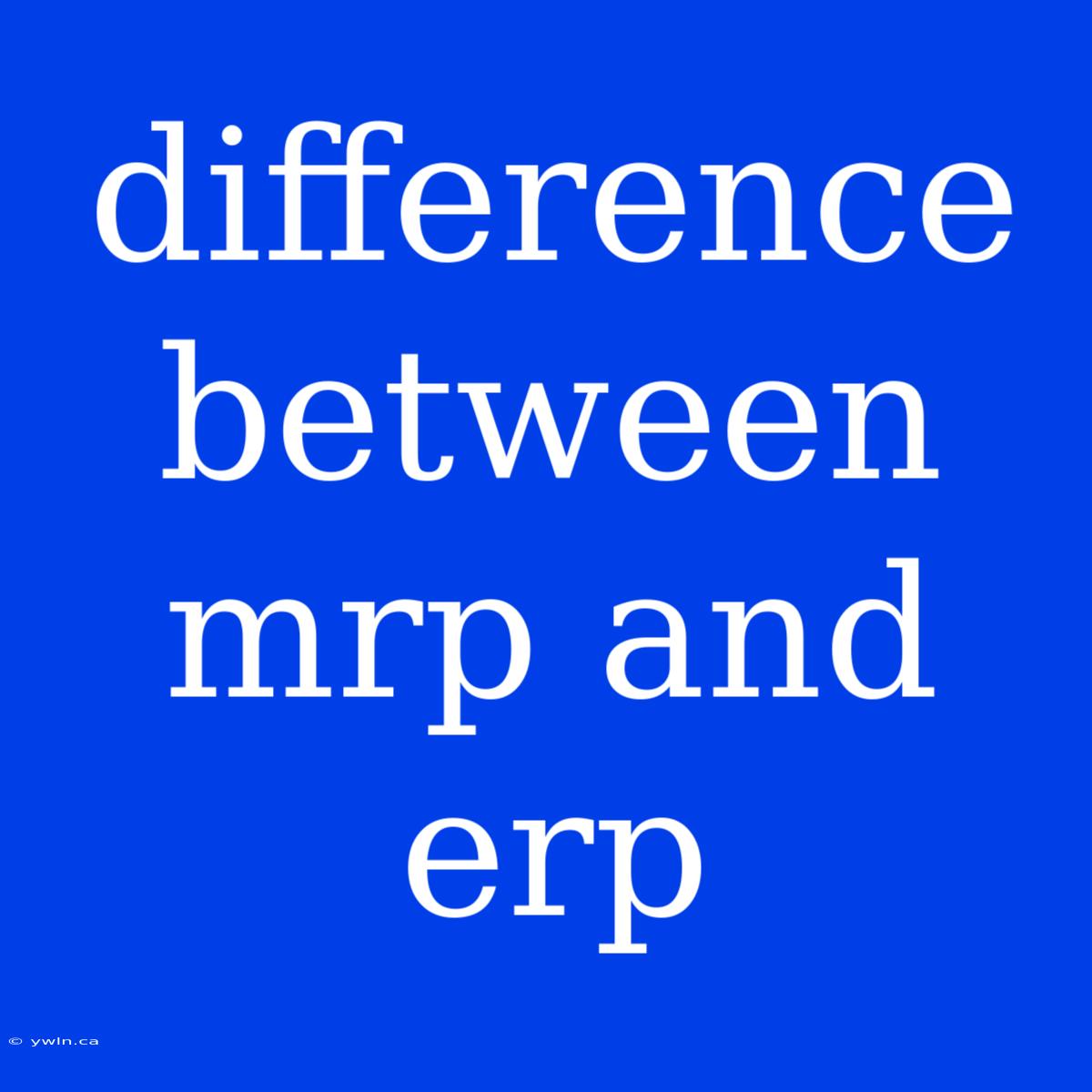Unlocking the Difference: MRP vs ERP - A Deep Dive for Your Business
What's the difference between MRP and ERP? MRP and ERP are both powerful tools for managing your business operations, but they differ significantly in their scope and functionality. MRP focuses primarily on material planning, while ERP encompasses a much wider range of business processes. This comprehensive guide delves into the distinctions, benefits, and real-world applications of each system.
Editor Note: Understanding the differences between MRP and ERP is crucial for businesses seeking to streamline operations, optimize resource allocation, and make informed decisions. Choosing the right system can significantly impact efficiency and profitability.
Analysis: We've conducted extensive research, analyzed industry best practices, and compiled insights from experts to develop this guide. We aim to provide a clear understanding of MRP and ERP, helping you determine the best fit for your business needs.
Key Takeaways:
| Feature | MRP | ERP |
|---|---|---|
| Focus | Material planning | Business process management |
| Scope | Production, inventory | Finance, HR, Sales, Marketing, etc. |
| Modules | Bill of materials, inventory control, capacity planning | Financial accounting, inventory management, human resources, CRM, supply chain management |
| Complexity | Lower | Higher |
| Cost | Lower | Higher |
MRP: Managing Materials Efficiently
Introduction: MRP stands for "Material Requirements Planning". It's a planning and control system designed to optimize material flow within a manufacturing environment.
Key Aspects:
- Bill of Materials (BOM): Defines the components and quantities required to build a finished product.
- Inventory Control: Tracks and manages raw materials, work-in-progress, and finished goods.
- Capacity Planning: Evaluates production capacity and resources needed to meet demand.
Discussion: MRP's core function is to ensure that the right materials are available at the right time to meet production demands. It helps prevent stockouts, reduces waste, and optimizes production scheduling. MRP is particularly beneficial for manufacturing businesses with complex production processes and a need for precise material management.
ERP: A Holistic Business System
Introduction: ERP stands for "Enterprise Resource Planning". It encompasses a broad spectrum of business processes, providing a centralized platform for managing and coordinating all aspects of an organization.
Key Aspects:
- Financial Management: Accounts payable, accounts receivable, budgeting, financial reporting.
- Human Resources: Payroll, recruitment, training, performance management.
- Sales and Marketing: Customer relationship management (CRM), order processing, marketing automation.
- Supply Chain Management: Procurement, inventory management, distribution, logistics.
Discussion: ERP systems aim to integrate and streamline all core business functions, providing a single source of truth for data and insights. This integrated approach improves collaboration, reduces data silos, and enables better decision-making across departments.
Choosing the Right System
Introduction: The decision between MRP and ERP depends on your business size, industry, and specific requirements.
Further Analysis:
- Small Businesses: MRP might be sufficient for managing materials and production.
- Medium and Large Enterprises: ERP offers comprehensive capabilities for managing diverse business operations.
- Manufacturing Companies: MRP is crucial for optimizing production processes.
- Service-Oriented Businesses: ERP can improve customer management, project management, and financial operations.
Closing: While MRP focuses on material planning, ERP offers a broader perspective, integrating various business functions for optimal efficiency and growth. The right choice depends on your specific business needs and goals.
FAQ
Introduction: This section addresses common questions about MRP and ERP.
Questions:
-
Q: What are the advantages of using MRP? A: Improved inventory control, reduced production costs, optimized scheduling, and better utilization of resources.
-
Q: What are the advantages of using ERP? A: Improved efficiency, better data visibility, enhanced collaboration, and streamlined business processes.
-
Q: Is ERP more expensive than MRP? A: Generally, yes. ERP systems are typically more expensive to implement and maintain than MRP.
-
Q: Can I use both MRP and ERP? A: Yes, you can use MRP as a module within an ERP system or integrate MRP with existing ERP software.
-
Q: What are some common ERP solutions? A: Popular ERP solutions include SAP, Oracle, Microsoft Dynamics, and NetSuite.
-
Q: What are some common MRP solutions? A: Popular MRP solutions include Oracle Primavera, SAP APO, and Infor Visual.
Summary: Both MRP and ERP play vital roles in managing business operations. Choosing the right system is crucial for optimizing performance and achieving long-term growth.
Transition: This section provides practical tips for implementing MRP or ERP successfully.
Tips for Implementing MRP or ERP
Introduction: This section outlines key tips for implementing MRP or ERP systems effectively.
Tips:
- Define clear objectives and goals: Determine your specific needs and expected outcomes from the system.
- Choose the right vendor: Select a provider offering solutions that align with your business requirements and budget.
- Involve key stakeholders: Engage employees from relevant departments to ensure their input and buy-in.
- Provide adequate training: Train users to maximize system utilization and ensure efficient adoption.
- Monitor and adapt: Continuously review and adjust the system to optimize performance and meet evolving needs.
Summary: Implementing MRP or ERP requires careful planning, stakeholder involvement, and ongoing optimization.
Transition: This section provides a comprehensive summary of the article's key insights.
In Conclusion
Summary: This guide explored the critical differences between MRP and ERP, highlighting their unique features and applications. MRP focuses on material planning, while ERP provides a comprehensive platform for managing diverse business processes.
Closing Message: Understanding the nuances of MRP and ERP is essential for businesses seeking to optimize operations and drive growth. Choosing the right system based on specific needs will pave the way for increased efficiency, better data management, and informed decision-making.

